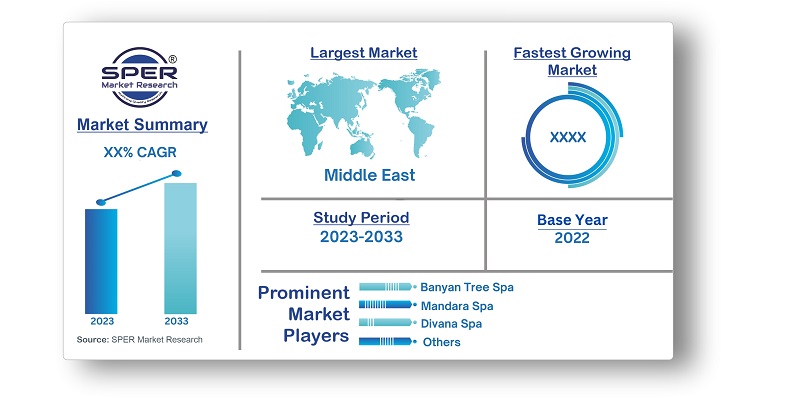
Thailand Spa Market Growth, Size, Trends, Demand, Revenue, Competition and Future Outlook
Thailand Spa Market Size- By Type- Regional Outlook, Competitive Strategies and Segment Forecast to 2033
| Published: Feb-2024 | Report ID: FMCG2448 | Pages: 1 - 104 | Formats*: |
| Category : Consumer & Retail | |||


| Report Metric | Details |
| Market size available for years | 2020-2033 |
| Base year considered | 2023 |
| Forecast period | 2024-2033 |
| Segments covered | By Type |
| Regions covered | Eastern Region, Western Region, Northern Region, Southern Region |
| Companies Covered | Banyan Tree Spa, Mandara Spa, Let’s Relax Spa, Divana Spa, Anantara Spa, Others. |
- Affluent Individuals
- Tourists
- Wellness Enthusiasts
- Business Professionals
- Couples
- Special Occasion Celebrants
| By Type: |
|
| By Region: |
|
- Thailand Spa Market Size (FY’2024-FY’2033)
- Overview of Thailand Spa Market
- Segmentation of Thailand Spa Market By Type (Salon Spa, Hotel and Resort Spa, Medical Spa, Destination Spa, Thermal Spring Spa, Others)
- Expansion Analysis of Thailand Spa Market
- Problems and Obstacles in Thailand Spa Market
- Competitive Landscape in the Thailand Spa Market
- Impact of COVID-19 and Demonetization on Thailand Spa Market
- Details on Current Investment in Thailand Spa Market
- Competitive Analysis of Thailand Spa Market
- Prominent Players in the Thailand Spa Market
- SWOT Analysis of Thailand Spa Market
- Thailand Spa Market Future Outlook and Projections (FY’2024-FY’2033)
- Recommendations from Analyst
1.1. Scope of the report1.2. Market segment analysis
2.1. Research data source2.1.1. Secondary Data2.1.2. Primary Data2.1.3. SPER’s internal database2.1.4. Premium insight from KOL’s2.2. Market size estimation2.2.1. Top-down and Bottom-up approach2.3. Data triangulation
4.1. Driver, Restraint, Opportunity and Challenges analysis4.1.1. Drivers4.1.2. Restraints4.1.3. Opportunities4.1.4. Challenges4.2. COVID-19 Impacts of the Thailand Spa Market
5.1. SWOT Analysis5.1.1. Strengths5.1.2. Weaknesses5.1.3. Opportunities5.1.4. Threats5.2. PESTEL Analysis5.2.1. Political Landscape5.2.2. Economic Landscape5.2.3. Social Landscape5.2.4. Technological Landscape5.2.5. Environmental Landscape5.2.6. Legal Landscape5.3. PORTER’s Five Forces5.3.1. Bargaining power of suppliers5.3.2. Bargaining power of buyers5.3.3. Threat of Substitute5.3.4. Threat of new entrant5.3.5. Competitive rivalry5.4. Heat Map Analysis
6.1. Thailand Spa Market Manufacturing Base Distribution, Sales Area, Product Type6.2. Mergers & Acquisitions, Partnerships, Product Launch, and Collaboration in Thailand Spa Market
7.1. Thailand Spa Market Value Share and Forecast, By Type, 2024-20337.2. Salon Spa7.3. Hotel and Resort Spa7.4. Medical Spa7.5. Destination Spa7.6. Thermal Spring Spa7.7. Others
8.1. Thailand Spa Market Size and Market Share
9.1. Thailand Spa Market Size and Market Share By Type (2020-2026)9.2. Thailand Spa Market Size and Market Share By Type (2027-2033)
10.1. Thailand Spa Market Size and Market Share By Region (2020-2026)10.2. Thailand Spa Market Size and Market Share By Region (2027-2033)10.3. Eastern Region10.4. Western Region10.5. Northern Region10.6. Southern Region
11.1. Banyan Tree Spa11.1.1. Company details11.1.2. Financial outlook11.1.3. Product summary11.1.4. Recent developments11.2. Mandara Spa11.2.1. Company details11.2.2. Financial outlook11.2.3. Product summary11.2.4. Recent developments11.3. Let’s Relax Spa11.3.1. Company details11.3.2. Financial outlook11.3.3. Product summary11.3.4. Recent developments11.4. Divana Spa11.4.1. Company details11.4.2. Financial outlook11.4.3. Product summary11.4.4. Recent developments11.5. Anantara Spa11.5.1. Company details11.5.2. Financial outlook11.5.3. Product summary11.5.4. Recent developments11.6. Others
SPER Market Research’s methodology uses great emphasis on primary research to ensure that the market intelligence insights are up to date, reliable and accurate. Primary interviews are done with players involved in each phase of a supply chain to analyze the market forecasting. The secondary research method is used to help you fully understand how the future markets and the spending patterns look likes.
The report is based on in-depth qualitative and quantitative analysis of the Product Market. The quantitative analysis involves the application of various projection and sampling techniques. The qualitative analysis involves primary interviews, surveys, and vendor briefings. The data gathered as a result of these processes are validated through experts opinion. Our research methodology entails an ideal mixture of primary and secondary initiatives.



Frequently Asked Questions About This Report
PLACE AN ORDER
Year End Discount
Sample Report
Pre-Purchase Inquiry
NEED CUSTOMIZATION?
Request CustomizationCALL OR EMAIL US
100% Secure Payment






Related Reports
Our Global Clients
Our data-driven insights have influenced the strategy of 200+ reputed companies across the globe.




















